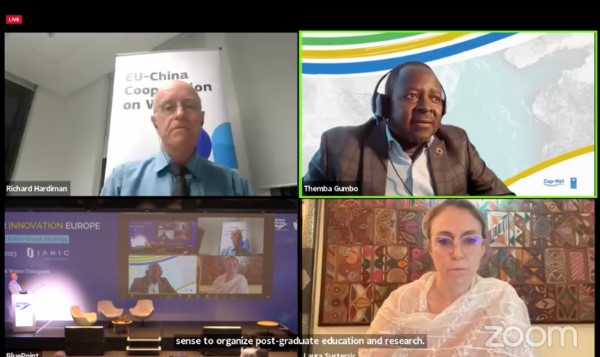Intervention by Dr. Themba Gumbo, Director - Cap-Net UNDP
(lightly edited for clarity)
"Good afternoon colleagues. I'm joining you from Pretoria in South Africa where I’m based. It's a pleasure and honour of course to share some experiences in terms of international cooperation, particularly from where I'm coming from in terms of water education capacity development, which is, I think, a key factor in ensuring that there’s cooperation and also there’s peace around water.
I'm trying to make an argument that it makes good sense to organize post-graduate education and research on water resources on a regional scale. This is because water is a transboundary dimension that poses delicate sharing questions. An approach that promotes a common understanding of what the real water-related issues are results in future water specialists speaking a common water language (hopefully) and that enhances mutual respect and trust and thus can be considered as an investment in the future.
We cannot ignore that investment which is required and other issues which don't just pop up overnight. So I would like to, as we proceed, give you a flavour of what has taken place in a number of projects within Cap-Net and also, more specifically, one of our affiliated networks - Water-Net, which focuses on the Southern African Development Community (SADC) countries, which uses capacity building as the entry point.
It took four years to establish WaterNet to develop the curriculum of a master's degree program in Integrated Water Resources Management (IWRM). This WaterNet concept was actually prompted by the SADC-EU Conference on the Management of Shared River Basins, held in Maseru, Lesotho in 1997, when the ministers of water in southern Africa and Europe articulated an urgent need to level the playing field between riparian countries and thus to prioritize capacity development. Eventually WaterNet was formed in 2000 so we are talking about 24 years of experience.
I wanted to mention three main lessons that have been learned from WaterNet. Gaetano [moderator], I know you are challenging us a little bit more that at times, these regional initiatives don't work as much as they would work in SADC countries. I think there are a number of ingredients which need to be in place to have success and impact.
Most of the SADC countries are relatively peaceful, so as a start, this gave ground to have a regional approach to water education and research.
The first lesson I wanted to mention is that for regional water education and research to be effective, it must have a legitimate ownership structure and a clear mandate.
The second lesson is that it makes sense to organise water-related education and training opportunities at regional and transboundary scale, not only because knowledge resources are scattered but also the topic “water” has regional and transboundary scope.
The third lesson from the region is that jointly developing educational programs by sharing expertise and resources requires intense intellectual management and sufficient financial means. So part of WaterNet’s success has been realized because there has been a long-term commitment from funding partners that appreciate and acknowledge the value and benefit of knowledge sharing.
WaterNet’s experience would never have evolved from an innovative experiment into a recognized regional institution with tangible impact."

